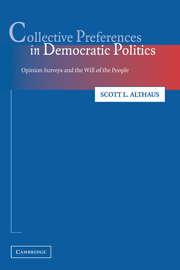Book contents
- Frontmatter
- Contents
- List of Figures and Tables
- Acknowledgments
- 1 Introduction
- PART I ILLUSIONS OF AGGREGATION
- PART II INFORMATION EFFECTS IN COLLECTIVE PREFERENCES
- 4 The Impact of Information Effects
- 5 The Structure and Causes of Information Effects
- 6 The Temporal Dynamics of Information Effects
- PART III OPINION SURVEYS IN DEMOCRATIC POLITICS
- Appendix A Political Knowledge Indices
- Appendix B Methodology
- References
- Index
5 - The Structure and Causes of Information Effects
Published online by Cambridge University Press: 06 January 2010
- Frontmatter
- Contents
- List of Figures and Tables
- Acknowledgments
- 1 Introduction
- PART I ILLUSIONS OF AGGREGATION
- PART II INFORMATION EFFECTS IN COLLECTIVE PREFERENCES
- 4 The Impact of Information Effects
- 5 The Structure and Causes of Information Effects
- 6 The Temporal Dynamics of Information Effects
- PART III OPINION SURVEYS IN DEMOCRATIC POLITICS
- Appendix A Political Knowledge Indices
- Appendix B Methodology
- References
- Index
Summary
Simulating the opinions of a hypothetical fully informed public reveals that surveyed opinion is influenced in significant ways by the low levels and uneven social distribution of political knowledge. But Chapter 4 has left us with something of a mystery. Each individual making up the collective has a fixed amount of political knowledge at the time they express their opinions in surveys. If the size of information effects were merely determined by these fixed levels of political knowledge, such effects should be approximately the same size across questions and within individuals. Yet they are not. Individual-level effects are larger for some topics, smaller for others. They are more randomized in some questions, so that they bias the collective preference hardly at all, and more systematically distributed in others. Information effects also have consistent patterns of directional impact for certain types of questions. When controlling for information asymmetries, collective opinions become less approving of presidents and Congress, less hawkish and isolationist on foreign policy, less conservative on social and equal rights issues, and more conservative on governance, environmental, and morality issues. If levels of general political knowledge are constant within individuals, then variance in the size and direction of information effects must arise from something else besides knowledge, or something that works in conjunction with knowledge, or something that conditions the impact of knowledge.
Some of this variance may be attributed directly to the topical domains of different questions, which cover issues more and less familiar to the typical survey respondent.
- Type
- Chapter
- Information
- Collective Preferences in Democratic PoliticsOpinion Surveys and the Will of the People, pp. 145 - 195Publisher: Cambridge University PressPrint publication year: 2003



